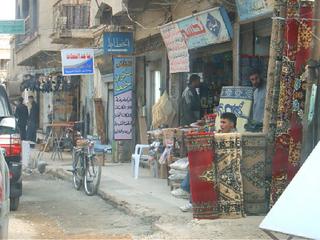
Over the last couple of weeks, the media has reported a rise in violence occurring in Iraq, mostly within the northern cities of Baghdad and Fallujah. For those of you who follow the headlines from Iraq, you may recall the recent deaths of 5 soldiers killed on March 31 when the armored personnel carrier they were riding in drove over an anti-tank mine. The mine exploded, destroying the APC and killing all of it's occupants. This tragedy was compounded when four civilian contractors from the North Carolina firm Blackwater were attacked and killed, with angry mobs subsequently mutilating their bodies and hanging the corpses from a bridge. Pictures of their charred remains were splashed across the front pages of national and international newspapers, while television stations aired footage taken from personal video cameras. Unfortunately, tragedies like these fuel the media frenzy by providing juicy stories for folks at home who, for the most part, have no connection to Iraq and most likely cannot even locate Iraq on a map. What purpose is served when the average citizen reads only of violence and bloodshed? As pointed out by a friend of mine serving with the Marine Corps Reserve in Baghdad, the media rarely reports anything positive from Iraq. They (the media) seem to revel in stories that portray a "negative, defeatist viewpoint." How many dead this time? How many injured? Are we reverting to the days when a body-count dictates whether we continue to pursue freedom and basic human rights for a country that has suffered under years of tyrannical leadership?
When was the last time you read of something positive being accomplished in Iraq? Hard to recall, isn't it? Where are the stories of the medical facilities being built where no medical facility previously existed? How about the construction of schools for children who have never owned a book? Over the past couple months, I've seen children playing in in the streets of Basra who've never touched a real toy. They play with rusty cans, empty boxes or a car tires they've found in heaping piles of garbage that dot the city. How about a story on the introduction of sanitation services in a city that hasn't seen a single collection of garbage in 12 years? Or a story about the toys donated by American charities to the local "Save the Children" facility in Basra?
Since my arrival, I've seen some remarkable changes occurring throughout the southern region of Iraq. Sure, the country is far from beautiful. However, every time we return to Al Nasiriyah, or Al Samawa or any of the other small towns we've traveled, I see improvements in the infrastructure of this country which never before existed. Under Saddam's rule, the majority of national funds were funneled to party officials in Baghdad and Tikrit, or other Sunni strongholds. Most Shiite dominated areas, such as Basra, suffered as a result and never received funding for basic services that we take for granted, such as water, electricity or medical services. Imagine living your entire life in a squalid adobe home, complete with dirt floors but no roof. Imagine never having plumbing or running water, and gathering all of your drinking water from the nearest rain puddle. These are the conditions that the coalition is attempting to change.
I'd like to see stories that equally portray the coalition's military successes alongside their failures. Yes, 5 soldiers were killed in Fallujah, but so were 18 bad guys who would have done anything to impede our progress. Multiple weapons caches were seized and destroyed, which prevents those weapons from ever being used to hurt another soldier or innocent Iraqi civilian. While millions live in Iraq, only hundreds participate in the violence you see in the media. Most Iraqi's want only two things - security and income. It doesn't matter who delivers it; America, Britain, or any other country. Give the population the security they need to earn the income they desire and success will dominate over failure.
Ensuring the success of this mission isn't easy. We still face incredible challenges, and unfortunately, more injuries and deaths of American citizens will occur. The few who resist the coalition will make it difficult, but not impossible. For the most part, the Iraqi's I've spoken with understand the need for a coalition presence until Iraq is strong enough to take care of itself. They may not like it, but they understand the need for our presence and what we are trying to accomplish.
Everyone who serves in Iraq, be they military or civilian, does so on a voluntary basis. The draft ended long ago, and enlisting servicemembers understand that in today's world, a servicemember's duty is a dangerous job that will take them to dangerous places. Whether we are here out of our sense of duty, the extra money or the pursuit of adventure, all know and accept the risks associated with being in such a place. Families at home hate it. However, for those of us who've seen some of the real progress made, the risk is worth being part of it all. I'd like to think that someday I'll be able to return to Iraq and see a country resembling Kuwait, Bahrain or even Dubai.
No comments:
Post a Comment